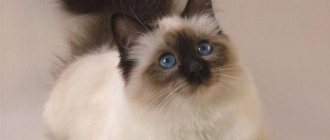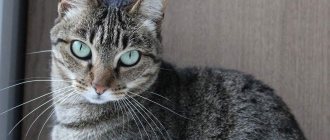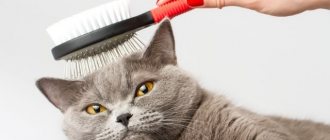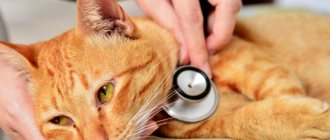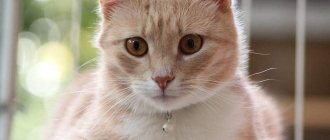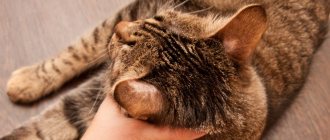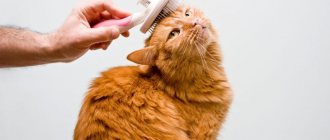In some cases, the cat must be put into a state of sleep, but this cannot be done without special medications. For this reason, animals are prescribed medications that have a pronounced sedative effect. Such medications should never be used without consulting a doctor, as they can provoke dangerous negative reactions.
- 2 Types of sleeping pills for cats - table
- 3 Which drug to choose
3.1 When you can use sedatives and homeopathic medicines
How do sedatives work?
The composition of sedatives includes chemical components, extracts from medicinal plants, hormones that have the following actions:
- relieve muscle spasms;
- calm down;
- reduce pain;
- normalize blood pressure;
- reduce the feeling of fear.
A sedative and sleeping pill for cats affects blood circulation in the brain, normalizes metabolism, affects the psycho-neurological state, the process of excitation or inhibition, and inhibits the reproductive system.
When to use medications
Sedatives and sleeping pills for cats are prescribed for anxious behavior with obvious disturbances in nervous activity. In addition, you cannot do without sedatives in the following situations:
- medical intervention - wound treatment, examination, vaccination;
- long journey – during transportation the animal often panics;
- adaptation to the situation - a new place of residence causes aggression;
- nervous disorders - obsessive actions, increased nervousness;
- mental disorders - fear, phobias, anxiety, aggression;
- marking the territory - excitement, hormonal surge, increased sexual desire;
- aggression in the presence of strangers;
- visiting salons, exhibitions, groomers.
When a cat tries to take a dominant position, there is no need to punish the animal by indicating “its place.” You can relieve nervous tension and aggression by using a herbal preparation with a mild sedative property.
Mental abnormalities are noticeable by the following signs:
- hunting for a non-existent target;
- constant licking of oneself, leading to the formation of wounds and hair loss;
- self-directed aggression;
- twitching of limbs, head, jumping.
Mental disorders manifest themselves in different ways; if you notice unusual behavior in your pet, you should immediately consult a doctor.
Possible causes of stress
In what stressful situations should you resort to drugs:
- change of residence, repairs, rearrangement of furniture;
- purchasing a new type of food or litter for the tray;
- even temporary absence or separation from the owners;
- visit of guests;
- the arrival of a new pet or child in the family;
- travel;
- visiting a veterinary clinic or groomer;
- exhibitions, any events;
- walking;
- hormonal surge.
All these seemingly insignificant events can unsettle even a calm animal. In some cases, for example, when visiting guests, you can do without taking sedatives. You need to worry about creating a safe, secluded area for the cat in advance. A house or basket placed in a quiet place will do the job perfectly.
More traumatic events can be moving, traveling, or medical procedures. In this case, medications will help the pet survive them without consequences for the nervous system. In some cats, estrus is severe and causes them discomfort, so drops in this case will not be superfluous.
Types of drugs
Calming and sleeping pills for cats come in different periods of effect:
- short (no more than 3 hours) – prescribed to regulate sleep for a certain time;
- medium (5-6 hours) – used as anesthesia during surgery or moving;
- long (9-11 hours) – prescribed for the treatment of nervous system disorders, pain relief procedures.
The effect of medications on the body:
- a large dosage will cause “drug intoxication”;
- a small dose acts as a mild sedative.
Sedatives and sleeping pills for cats are used only as prescribed by a doctor. The medicine must be certified and approved for use by the veterinary service.
Hormonal, pheromones
Hormones are produced by the endocrine glands, regulate the body's metabolic processes, and have a powerful effect and physiological activity. In case of increased sexual desire, arousal, or treatment of certain diseases, a hormonal-based sedative is indicated for the pet:
- "Contra-sex";
- "Sex barrier";
- "Stopintim";
- "Covinan";
- "Dexafort";
- "Alizin."
With the help of synthetic analogues of natural pheromones, the cat’s emotional mood is stabilized with the following behavior:
- active marking of the territory;
- peeling walls, upholstered furniture;
- apathy, loss of appetite.
Pheromones create a feeling of security, serenity in the animal, and restore good health. A liquid that smells of lavender or chamomile is soaked into the collar, napkins, and sprayed into the air. Stress in a cat goes away quickly, the drug is not addictive and does not affect people.
Before bathing, the collar soaked in the product is removed.
Homeopathic
Homeopathic sedative and sleeping pills for cats are made from medicinal roots, herbs, flowers. Available in the form of drops, capsules, spray, tablets.
For the drug to work, it is taken for a long time to accumulate the active substances in the body. Natural homeopathic medicines include:
- “Vetspokoin”, “Kalmin” - sedative;
- “Fitex” - consists of extracts of medicinal herbs, calms, reduces the aggression of the animal;
- “Cat-bayun” – consists of extracts of medicinal herbs, course of treatment is 1 week;
- “Anti-stress” – contains motherwort, B vitamins, taurine, ascorbic acid;
- “Fospasim” – used for 2 weeks for fear of noise, neuroses;
- “Stop-stress” - phenibut is added to medicinal herbs, taken for a course of 3 weeks.
Homeopathic medicines do not cause side effects and are indicated for panic attacks and phobias that recur periodically. Homeopathy is suitable for pets in poor health, young kittens, and old animals.
Sleeping pills of chemical origin
Prescribed only by a doctor for neuropsychic disorders, long-term transportation, and other alarming situations:
- “Valium” – relieves aggression, increases appetite;
- “Ventraquil” – injections are intended to completely immobilize a pet for an hour;
- "Xylazal" - acts quickly, the animal instantly falls asleep.
Barbiturates are used in extreme cases, for neurological pathologies, convulsions:
- "Primidone", "Phenobarbital";
- "Hydantoin", "Primidon".
Medicines in this group negatively affect mental development.
Tranquilizers
Sleeping pills of this group enhance the effect of analgesics, suppress fear, and reduce muscle tone. Used for illnesses and transportation, when conventional sedatives do not help:
- "Amizil" - analgesic, sedative, relaxing;
- "Diazepam" - relaxes muscles, relieves increased excitability, aggression, anxiety, nervousness;
- "Chlozepid" - treats arthritis, myositis, skin diseases, anxiety;
- “Phenazepam” is a strong sleeping pill, reduces seizures;
- "Mebicar" is non-toxic, reduces the feeling of fear, and does not impair movement coordination.
Anxiolytics best fight anxiety, anxiety disorders, and phobias:
- "Fluoxetine";
- "Buspirone."
This group of drugs is indicated for the effects of schizophrenia, depression, and mood swings.
Before medications are prescribed, they are tested for tolerability.
Side effects
You cannot rely on sedatives as a panacea or remedy for any stress in a cat. Just like humans, pets' nervous systems are adaptable. Sometimes you need to let your pet experience frustration and learn life lessons from it. Helping a kitten with your attention, affection and care means laying a brick in the foundation of reverent affection and friendship.
In addition, any, even the mildest, medicine has a number of contraindications and side effects. They can cause allergies or addiction, disrupt intestinal motility, and provoke the development of gastritis.
The stronger the drug, the greater the likelihood of its negative effect on the heart, blood vessels and nerve fiber.
There is always a risk of unpredictable individual reaction and death. It is advisable to consult a veterinarian before use.
Folk remedies
If there are no indications for the use of pharmaceutical sedatives and sleeping pills for a cat, when it is excited, folk remedies are used:
- bergamot oil – soak a napkin with oil and tie it to the animal’s collar;
- during the period of excitement, a copper plate is placed in a cup of water from which the cat drinks;
- add a drop of soda to the milk and give it to your pet to drink;
- give water slightly acidified with vinegar to drink.
When a cat constantly screams and calls for a cat, you can wet it under cold water - this cruel method will temporarily distract from excitement.
Where to buy and how much it costs
The purchase of any medications should be made in specialized places - pharmacies. It is also possible to purchase some drugs in pet stores. Since all well-known, trusted trading companies have online platforms where the best manufacturers exhibit their products, you can order goods online in an online store. If these are not prescription drugs, experienced consultants at pet stores will be able to tell you what they are and advise which one is best to buy. The funds are usually budgetary.
When not to take sedative medications
Sedatives and sleeping pills for cats, even of plant origin, have individual indications and should not be used in the following cases:
- during pregnancy and lactation;
- at low pressure;
- under the age of 1 year;
- for diseases of the kidneys, liver, diabetes.
Cats have an individual intolerance to some components of the drug, so it cannot be treated uncontrolled.
If after treatment with the chosen drug there are no changes in the cat’s behavior within 2 weeks, you should contact your veterinarian for a new prescription.
Valerian
There is a myth that valerian has a calming effect on the cat's body. This is not so, the medicine contains an active substance identical to the pheromones that are produced in cats during sexual arousal. Therefore, valerian does not calm cats, but excites them. In addition, the medicine is addictive and addictive.
Some sedative medications contain valerian extract in negligible doses that will not cause increased anxiety in your pet.
In what cases can sleeping pills be used?
Cats need to be not just calmed down, but put into forced sleep at special moments when complete immobility is required of them. It is not always possible to fix active and capricious predators in one position for a long time.
Their restlessness interferes with:
- when visiting a veterinary clinic. Some tests, long-term instrumental studies, manipulations, including those preparatory to surgical interventions, can be carried out only if the cat is completely motionless;
- rehabilitation after complex operations, as well as serious mental problems require the use of sleeping pills. They are included in complex therapy for critical behavioral disorders: aggression, hyperexcitability, marking of territory until the causes of the disorders are eliminated;
- grooming: for grooming, a particularly difficult, aggressive and nervous cat will need sleeping pills;
- transportation. It is quite difficult for a cat to travel long distances. To prevent a nervous breakdown and make transportation easier for accompanying people, it is easier if the cat takes sleeping pills on the road.
Rules for taking medication
You should start giving your pet medicine 2-3 days before moving, before:
- do not feed 12 hours before transportation;
- if the journey is long, reduce food portions;
- boiled water – do not limit.
The injections are given by a veterinarian. They give injections on their own with the doctor’s permission, strictly observing the dosage of the medicine:
- the animal is immobilized using a towel;
- slightly pull back the withers;
- The needle is inserted with a quick movement and the medicine is injected.
Medicines in the form of tablets, drops, powder are given with food. The tablet is crushed, mixed with food, and fed to the pet.
For an animal that has been given a sleeping pill before moving, good sleeping conditions are created:
- the cat should lie freely;
- the muzzle is turned to one side;
- to prevent the pet from vomiting when rocking, provide access to fresh air for breathing;
- cover with a light blanket.
The dose of sleeping pills depends on the duration of transportation and the animal’s resistance to stress.
It is prohibited to give animals sedatives intended for humans.
Which sleeping pill is better
For a cat that is waiting for a long journey, an X-ray, an ultrasound, a tomograph or a difficult haircut before an exhibition, the veterinarian will inject Xylanite, Vetranquil, Intraval, Rometar. They are used to quickly relax and calm the animal.
More serious tranquilizers with medium-term effects, as well as potent long-term drugs that are used for premedication, should be prescribed in the clinic in emergency cases; they are not suitable for haircuts or on the road.
Systematic use of sleeping pills is possible only for serious mental disorders. In this case, it is strictly forbidden to use human medicines.
Cat behavior
After taking a sedative, the cat becomes lethargic, quiet, and behaves peacefully. This means that the dose is chosen correctly and there are no adverse reactions. Sometimes taking sedatives and sleeping pills for a cat is accompanied by side effects:
- nausea, vomiting;
- diarrhea;
- loss of strength, pressure, drop in temperature;
- increased salivation;
- refusal to eat.
Side effects may include other atypical pet behaviors, including hallucinations.
Sedatives and sleeping pills for cats are addictive and should not be abused. Having settled a pet in your home, you need to treat it like a family member, with patience, respect, and not put pressure on it. When a cat is loved, he understands this and will not show aggression for no reason. Special medications only help to achieve the desired cat behavior for a short time. The owners can rid him of the psychological problem themselves by transforming their own behavior.
Mr. Cat recommends: principle of operation
There are two types of sedatives for cats:
- Soft herbal homeopathic preparations of prolonged action. They contain extracts of soothing herbs. They carefully relieve tension from the nervous system and act cumulatively, that is, they achieve the greatest effect after a few days of regular use.
- Medicines in tablets and injections that act instantly, but at the same time have a number of side effects and are not always safe.
The use of chemicals is a last resort when the benefit outweighs the potential risk to the cat's health.
Types of sleeping pills

